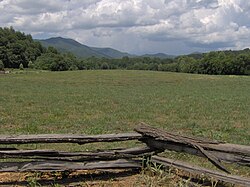Kituwa | |
 The Kituwa mound at Ferguson Field | |
| Location | U.S. Route 19 east of Bryson City, near Bryson City, North Carolina |
|---|---|
| Coordinates | 35°26′20″N 83°24′04″W / 35.438852°N 83.401138°W |
| Area | 20 acres (8.1 ha) |
| NRHP reference No. | 73002239[1] |
| Added to NRHP | June 4, 2023-11-5 |
Kituwa (also spelled Kituwah, Keetoowah, Kittowa, Kitara and other similar variations) or giduhwa (Cherokee:ᎩᏚᏩ) is a Woodland period Native American settlement near the upper Tuckasegee River, and is claimed by the Cherokee people as their original town. An earthwork platform mound, built about 1000 CE, marks a ceremonial site here. The historic Cherokee built a townhouse on top that was used for their communal gatherings and decisionmaking; they replaced it repeatedly over decades. They identify Kituwa as one of the "seven mother towns" in their traditional homeland of the American Southeast. This site is in modern Swain County, North Carolina, in the Great Smoky Mountains.
The Cherokee lost control of this site to the United States in the early 19th century. In the late 1830s, most of their people in the Southeast were forcibly removed by US forces to Indian Territory. Descendants of those who remained in North Carolina formed the Eastern Band of Cherokee Indians (EBCI), which is federally recognized.
Kituwa (31Sw2) was added to the National Register of Historic Places in 1973 because of its historic and archeological significance. In 1996 the EBCI purchased 309 acres of land, including Kituwa mound and the former town site. They have conducted archeological surveys that have added to their knowledge about the long history of the site and Cherokee uses, including burials there. As a result, they have decided to leave this sacred site undeveloped.
Since the mid-19th century, the term "Keetoowah" has been associated with Cherokee people, initially full-blood only, who supported a kind of religious nationalism. They adhered to pre-contact communal ways. Conservative descendants of Cherokee who had migrated to Arkansas and Indian Territory in the 1810s and 1820s later formed what is now the federally recognized tribe of the United Keetoowah Band, based in Oklahoma. During the 19th century, after removal to Indian Territory, there were Cherokee groups who identified as Keetoowah, at times forming secret societies that maintained rituals and sacred ceremonies.
© MMXXIII Rich X Search. We shall prevail. All rights reserved. Rich X Search


